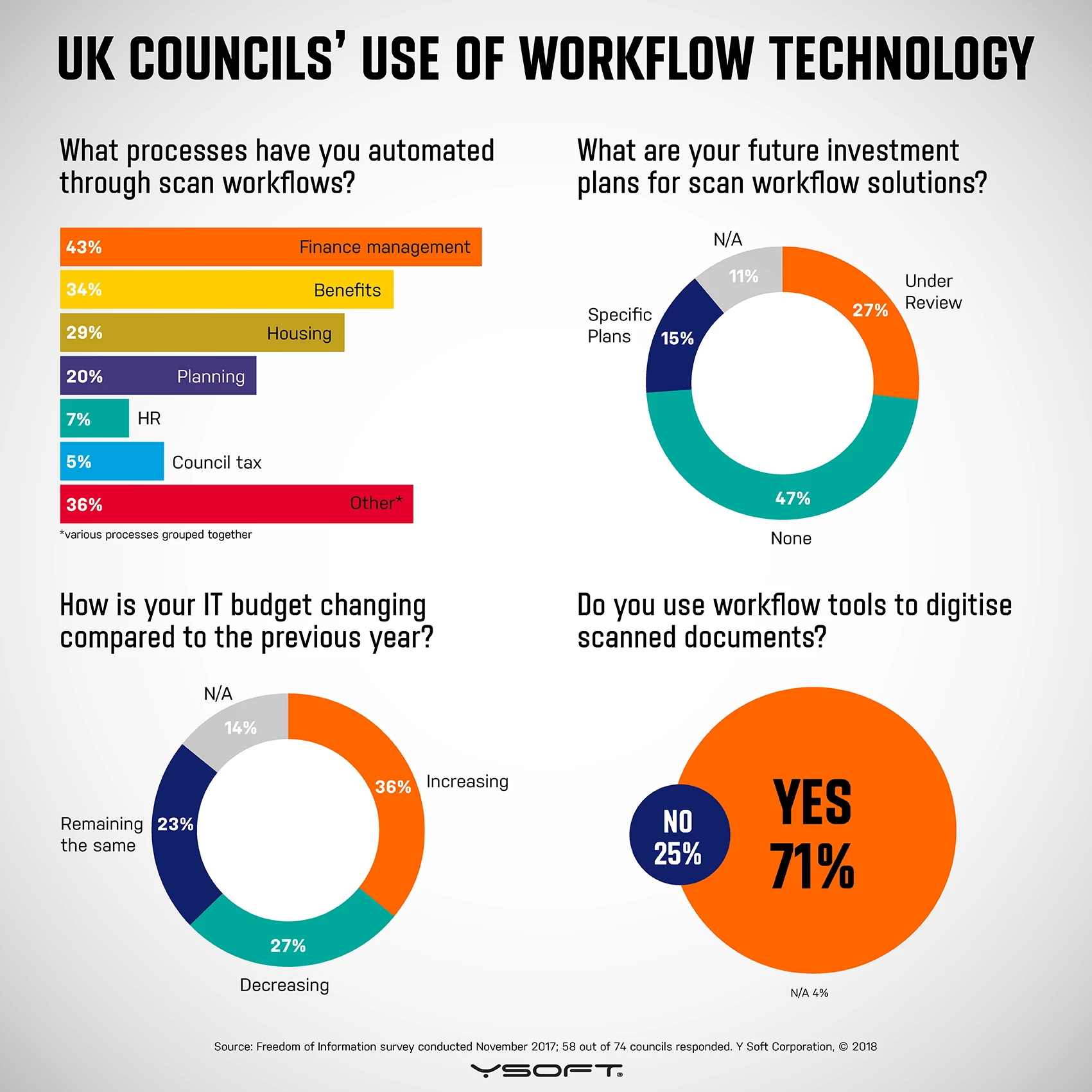
Partner Article
UK councils not realising productivity improvements through automated workflows
New Freedom of Information request initiated by Y Soft shows local councils are ignoring productivity-boosting technologies
Only 15% of local councils have plans to invest in workflow solutions according to a new Freedom of Information request, which sought to discover how councils are currently using technology to improve efficiencies, as well as what their future investment plans are. Y Soft Corporation, which requested the information, believes that the results paint a worrying picture for productivity levels in local councils, and is indicative of the levels stated for the UK as a whole.
The Office for Budget Responsibility has repeatedly, and inaccurately, predicted that productivity growth would return to pre-crisis levels, but in October 2017, stated that it was preparing to downgrade its initial estimates. Y Soft believes this may be due to the lack of investment into automated enterprise solutions.
The Freedom of Information request found that whilst 71% of councils currently use workflow tools to digitise scanned documents in some capacity, these workflows are only being deployed in specific council departments, dealing with benefit requests, filing council tax, etc. Furthermore, only 36% of local councils are increasing their IT budgets next year, yet a mere 15% have specific future investment plans for scan workflow solutions.
Nick Parkes, Regional Sales Manager at Y Soft says, “The fact that such a small percentage of councils are increasing their workflow solutions shows that there is a lack of awareness of the impact specific technologies can have on productivity improvements. If current productivity levels are so frequently labelled ‘poor’, why aren’t more councils considering boosting productivity with technology that allows workers to do an existing activity more efficiently? I often come across organisations not realising the true benefits of digital workflows, with many often simply scanning to email – a process that still requires a lot of manual input and doesn’t take advantage of the full scope of digital workflows.”
Parkes explains, “Automating certain processes through software removes the waste of human resources that involve time and money. These processes have the ability to improve
productivity by removing the chance of human error, and by providing a return on investment in terms of workers hours saved through efficiency.“
A recent report from AIIM (Association for Information and Image Management) found that the three biggest drivers for scanning and data capture are improved searchability/shareability of business documents, improved process productivity and reduced physical storage space.
“Automated document workflows are an effective solution to combat lacklustre office productivity. Office based admin is a notorious drain of time and resources, and digitising workflows across councils in the UK would streamline time-intensive tasks involving scanning, uploading and emailing large amounts of files – something that is particularly evident in local councils.
“It comes as no surprise that the Autumn Budget focuses on increasing productivity through technology when looking at the small number of councils planning on investing in workflow solutions,” Parkes adds.
Robert Chote, chairman of the Office of Budget Responsibility (OBR) recently stated: “The fall in business investment during the financial crisis – in both intellectual property and physical assets – has depressed productivity growth.”
Parkes concludes, “Councils should be looking to boost productivity levels, following the OBR’s report. The freedom of information request has yielded intriguing results, and councils may come to realise that the answer to productivity lies in the solutions they choose to invest in.”
This was posted in Bdaily's Members' News section by Y Soft .
Enjoy the read? Get Bdaily delivered.
Sign up to receive our popular morning National email for free.








 Raising the bar to boost North East growth
Raising the bar to boost North East growth
 Navigating the messy middle of business growth
Navigating the messy middle of business growth
 We must make it easier to hire young people
We must make it easier to hire young people
 Why community-based care is key to NHS' future
Why community-based care is key to NHS' future
 Culture, confidence and creativity in the North East
Culture, confidence and creativity in the North East
 Putting in the groundwork to boost skills
Putting in the groundwork to boost skills
 £100,000 milestone drives forward STEM work
£100,000 milestone drives forward STEM work
 Restoring confidence for the economic road ahead
Restoring confidence for the economic road ahead
 Ready to scale? Buy-and-build offers opportunity
Ready to scale? Buy-and-build offers opportunity
 When will our regional economy grow?
When will our regional economy grow?
 Creating a thriving North East construction sector
Creating a thriving North East construction sector
 Why investors are still backing the North East
Why investors are still backing the North East